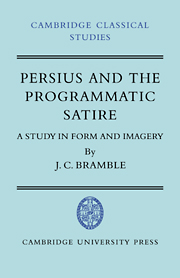Book contents
- Frontmatter
- Contents
- PARENTIBUS OPTIMIS
- APPENDIX 1 Accius and Pacuvius at Persius I. 76–8
- APPENDIX 2 Virgil and the moderns at Persius I. 96
- APPENDIX 3 The image of the child in ancient satire and diatribe
- APPENDIX 4 The disclaimer of malice
- TEXT
- TRANSLATION
- 1 INDEX OF MODERN AUTHORS
- 2 INDEX LOCORUM POTIORUM
- 3 INDEX OF IMAGES, TOPICS AND WORDS
APPENDIX 1 - Accius and Pacuvius at Persius I. 76–8
Published online by Cambridge University Press: 05 June 2014
- Frontmatter
- Contents
- PARENTIBUS OPTIMIS
- APPENDIX 1 Accius and Pacuvius at Persius I. 76–8
- APPENDIX 2 Virgil and the moderns at Persius I. 96
- APPENDIX 3 The image of the child in ancient satire and diatribe
- APPENDIX 4 The disclaimer of malice
- TEXT
- TRANSLATION
- 1 INDEX OF MODERN AUTHORS
- 2 INDEX LOCORUM POTIORUM
- 3 INDEX OF IMAGES, TOPICS AND WORDS
Summary
The matter of the punctuation and ascription of 76–8 presents various difficulties:
est nunc Brisaei quem venosus liber Acci, sunt quos Pacuviusque et verrucosa moretur Antiopa aerumnis cor luctificabile fulta.
If Persius speaks the words as a question, not as a statement, we have the anomaly of a satirist espousing the cause of an inflated and outmoded genre – this, in complete contradiction to the tradition bequeathed by Lucilius and Horace. If the interlocutor speaks them as a question, the position is much the same: for scornful dismissal by the interlocutor implies that the satirist favours the awkward archaic cause.
Another problem, concerning the monitus and sartago loquendi of the subsequent passage, arises from the assumption of an interrogative, 79 if.:
hos pueris monitus patres infundere lippos cum videas, quaerisne unde haec sartago loquendi venerit in linguas …?
If Persius has lamented the neglect of archaic tragedy by terminating 76–8 with a question-mark, the topics of paternal advice and corruption of poetic diction are left suspended, devoid of acceptable relationship to the enquiry which immediately precedes their introduction: the sole, and exceptionally weak solution would be to suppose that Persius' question implies that the old men have warned the youth away from archaic literature. This harsh sequence of thought would follow with greater ease if the interlocutor had dismissed archaic tragedy with a contemptuous question.
- Type
- Chapter
- Information
- Persius and the Programmatic SatireA Study in Form and Imagery, pp. 174 - 179Publisher: Cambridge University PressPrint publication year: 1974

